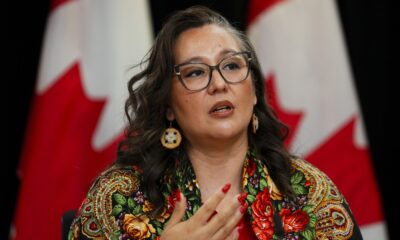Health
Colwood Moves to Solve Doctor Shortage with Municipal Clinic Initiative

Colwood, a small city located 12 kilometres west of Victoria, British Columbia, is taking decisive action to address a pressing shortage of family doctors. With a population of approximately 20,000, the community has struggled to attract medical professionals. In response, Mayor Doug Kobayashi, a former lieutenant-colonel and aeronautical engineer, has spearheaded an initiative to establish a municipal clinic. The proposal includes a full-time salary of $280,000 for family doctors, aiming to provide a compelling incentive for physicians to join the community.
The local government has adopted a proactive approach, believing that offering competitive salaries, a balanced work-life, and the promise of a pension will attract doctors who typically resist employment under municipal management. Currently, Colwood has secured three doctors, with ambitions to reach a total of eight. While this initiative reflects a growing trend among municipalities to lure medical professionals, it also highlights the challenges faced in the broader Canadian healthcare system.
Municipal Strategies to Attract Physicians
The challenges of recruiting family doctors are not unique to Colwood. Communities across Canada are experiencing similar difficulties, leading to various municipal strategies aimed at enticing medical professionals. Cities like Ottawa and Kingston are rolling out their own measures, such as appointing ambassadors for primary care and offering substantial signing bonuses. Kingston, for instance, has guaranteed a $100,000 signing bonus for new recruits.
As competition intensifies, some municipal leaders describe the current situation as an “arms race” for healthcare resources. Chris Peabody, the mayor of Brockton, Ontario, has voiced concerns about the implications of this competitive environment, particularly regarding equity for underserved rural areas.
While Colwood’s initiative may seem like an innovative solution, it raises important questions about the sustainability of such approaches. The supply of doctors is limited, and attracting professionals from other regions may lead to disparities. Wealthier municipalities can often outbid their less affluent counterparts, leaving smaller communities at a disadvantage.
Potential Risks and Consequences
The reliance on municipal governments to resolve healthcare shortages presents a significant policy shift within Canada’s Medicare system. This approach risks fragmenting primary care further, as municipalities may prioritize their interests over provincial healthcare goals. The potential for bidding wars among municipalities could inflate salaries, leading to a situation where provinces, such as British Columbia, respond with significant pay increases. In November 2022, B.C. provided family doctors with a 52 percent raise, illustrating the escalating costs associated with attracting healthcare professionals.
Moreover, the financial responsibility of operating a municipal clinic raises concerns about potential revenue shortfalls. If physician billings fail to cover operational costs, municipalities may have to increase property taxes or cut other essential services. This dynamic could create a strain on local resources, contradicting the initial intent of improving healthcare access.
The dual loyalty of physicians—being municipal employees while providing services funded by the province—adds another layer of complexity. Physicians may feel less connected to the provincial healthcare system, undermining efforts to create a cohesive primary care model.
Despite these challenges, there remains a glimmer of hope. The visibility of Colwood’s initiative may prompt provincial governments to take more aggressive action in addressing the primary care crisis. Possible solutions could include establishing team-based clinics that leverage the full scope of practice for all healthcare providers, enhancing nurse practitioner training programs, and fostering accountability for ensuring access to care.
As Colwood embarks on this ambitious journey, the outcome will likely shape the future of municipal involvement in healthcare across Canada. The effectiveness of their model remains to be seen, but it has already sparked a crucial dialogue about the responsibilities of various levels of government in solving the nation’s healthcare challenges.
For now, Colwood stands as a test case for other communities seeking to navigate the complexities of healthcare recruitment and delivery. As challenges persist, the question remains whether municipalities should shoulder the burden of resolving systemic issues within Medicare.
-

 Politics4 weeks ago
Politics4 weeks agoSecwepemc First Nation Seeks Aboriginal Title Over Kamloops Area
-

 World5 months ago
World5 months agoScientists Unearth Ancient Antarctic Ice to Unlock Climate Secrets
-

 Entertainment5 months ago
Entertainment5 months agoTrump and McCormick to Announce $70 Billion Energy Investments
-

 Science5 months ago
Science5 months agoFour Astronauts Return to Earth After International Space Station Mission
-

 Lifestyle5 months ago
Lifestyle5 months agoTransLink Launches Food Truck Program to Boost Revenue in Vancouver
-

 Technology3 months ago
Technology3 months agoApple Notes Enhances Functionality with Markdown Support in macOS 26
-

 Lifestyle3 months ago
Lifestyle3 months agoManitoba’s Burger Champion Shines Again Amid Dining Innovations
-

 Top Stories2 months ago
Top Stories2 months agoUrgent Update: Fatal Crash on Highway 99 Claims Life of Pitt Meadows Man
-

 Politics4 months ago
Politics4 months agoUkrainian Tennis Star Elina Svitolina Faces Death Threats Online
-

 Sports5 months ago
Sports5 months agoSearch Underway for Missing Hunter Amid Hokkaido Bear Emergency
-

 Politics5 months ago
Politics5 months agoCarney Engages First Nations Leaders at Development Law Summit
-

 Technology5 months ago
Technology5 months agoFrosthaven Launches Early Access on July 31, 2025





















